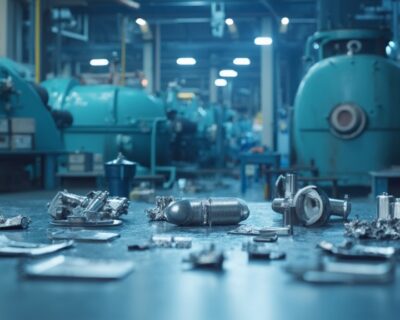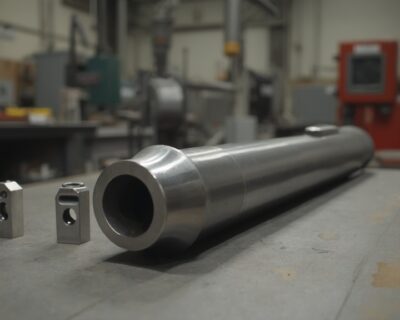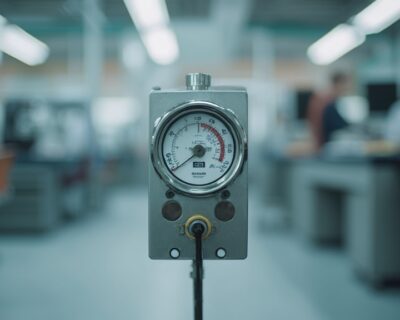Blogs

Exploring the Question: Is Titanium Stronger Than Steel in Engineering?
Introduction
Is titanium stronger than steel? This is a common question in the world of engineering and manufacturing, where choosing the right material is crucial. The answer depends on how you define “strong”—whether by tensile strength, strength-to-weight ratio, or resistance to corrosion and heat.
Titanium and steel are two of the most widely used metals today. Each comes with its own set of advantages that make it ideal for specific applications. Titanium is celebrated for its exceptional strength-to-weight ratio, outstanding corrosion resistance, and superior flexibility. These traits make it a go-to metal in aerospace, medical devices, and high-performance automotive components.
On the other hand, steel is known for its high tensile strength, cost-effectiveness, and versatility, making it a preferred material in construction, industrial machinery, and vehicle manufacturing.
In this guide, we’ll explore the key differences between titanium and steel, and help procurement managers, engineers, and manufacturers decide which metal is best suited to their performance, cost, and design needs.
Key Differences Between Titanium and Steel
Is titanium stronger than steel? The answer depends on which characteristics matter most for your project. Here’s how they compare:
- Weight and Density
Titanium is roughly 60% lighter than steel, which makes it an ideal material for weight-sensitive industries like aerospace, motorsports, and aviation. This reduction in weight enables more efficient designs and better fuel economy. - Mechanical Strength
Steel has a higher absolute tensile strength, meaning it can handle more force before breaking. However, titanium’s strength-to-weight ratio is superior, allowing it to perform just as well in lightweight applications. This makes titanium forgings a top choice for aerospace, defense, and medical implants. - Durability
Steel is extremely durable under mechanical stress, making it excellent for structural support in buildings and bridges. However, without protective coatings or alloying, it is prone to corrosion—something titanium naturally resists.
Understanding these differences is essential for professionals looking to match material properties with engineering goals.
Is Titanium Stronger Than Steel? Strength-to-Weight Comparison
Strength-to-Weight Ratio: Titanium Leads the Way
In terms of raw strength, steel often wins. But if we evaluate by strength-to-weight ratio, titanium comes out ahead. This is a critical advantage in applications where both durability and weight reduction matter, such as:
- Aircraft frames
- Racing vehicles
- Aerospace satellites
Titanium forgings, engineered through advanced manufacturing processes, deliver exceptional performance under pressure, while remaining lightweight. This makes them vital for industries under pressure to deliver performance amid supply chain challenges, including titanium shortages due to global conflicts like the war in Ukraine.
Corrosion Resistance: Titanium Excels
One of titanium’s most outstanding properties is its natural corrosion resistance. Thanks to a stable oxide layer that forms on its surface, titanium is resistant to:
- Saltwater corrosion
- Chemical processing environments
- Extreme weather conditions
Steel, however, requires coatings or alloying elements to resist rust. These treatments add to its long-term cost and maintenance requirements. This makes titanium a better option for marine, medical, and chemical industry applications where longevity matters.
Hardness vs Elasticity: Steel and Titanium Have Different Strengths
Steel is generally harder than titanium, offering better wear resistance in high-friction or abrasive environments. This makes it ideal for:
- Industrial tools
- Construction equipment
- Mechanical parts under constant load
Titanium, in contrast, is more elastic—it can bend under stress and return to its original shape without cracking. This elasticity is advantageous in applications such as:
- Aerospace structures
- Medical implants
- Automotive suspensions
This unique balance of strength and flexibility makes titanium suitable for components exposed to dynamic forces and thermal cycling.
High-Temperature Performance: Titanium Stays Strong
Titanium retains its mechanical integrity at high temperatures, up to 600°C, without significant weakening. In contrast, common steels may lose strength when exposed to similar conditions.
This makes titanium ideal for:
- Jet engines
- Exhaust systems
- Spacecraft components
The ongoing shortage of titanium, partly due to the war in Ukraine, has impacted aerospace production. Manufacturers are now focusing on agile supply chain strategies to secure reliable sources of this critical metal.
Applications of Titanium vs Steel
Titanium Applications:
- Aerospace structures and engines
- Surgical implants and instruments
- High-performance automotive parts
- Marine vessels and desalination plants
Titanium’s light weight, biocompatibility, and resistance to harsh conditions make it essential for industries where precision and reliability are non-negotiable.
Steel Applications:
- Building frameworks
- Heavy machinery and tools
- Vehicle bodies and components
- Bridges, pipelines, and industrial structures
Steel’s low cost and high strength make it the material of choice for large-scale and budget-conscious projects.
Cost Considerations: Titanium vs Steel
Steel is cheaper and more abundant, which is why it’s used in so many industries. However, its need for corrosion protection can lead to higher maintenance costs over time.
Titanium is more expensive to extract and process, which results in higher upfront costs. But its long-term value is often greater in high-performance applications due to:
- Reduced weight and fuel costs
- Lower maintenance needs
- Greater lifespan
With increasing pressure on industries to decarbonize, the efficiency and sustainability of materials like titanium become even more attractive. Titanium’s performance in extreme environments also reduces the likelihood of failure, making it a smart investment in critical applications.
Conclusion: Making the Right Choice
Both titanium and steel are indispensable, but their unique properties suit different needs:
- Choose titanium when your project demands lightweight strength, corrosion resistance, and high-temperature stability—especially in aerospace, medical, and advanced automotive sectors.
- Opt for steel when you need robust, cost-effective support for heavy loads, as seen in construction, machinery, and conventional vehicle manufacturing.
The choice ultimately depends on your specific requirements, budget, and performance expectations. As global supply chains face challenges and industries pursue sustainability, making informed material choices has never been more important.
Need High-Performance Materials?
Explore our range of premium titanium, steel, and alloy products at Domadia. We offer reliable sourcing, expert support, and custom solutions tailored to your project’s needs. Let us help you make the right material decision—contact us today!




